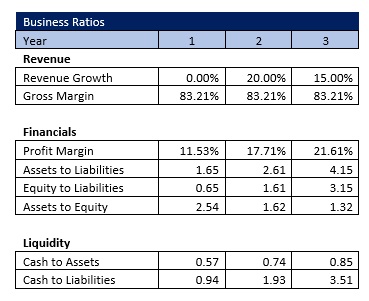Please note that the financials in this complete free business plan are completely fictitious and may not match the text of the business plan below. This free business plan demonstration purposes only. If you are interested in purchasing the completed editable MS Word and Excel documents for this business plan, please click the button below! Also, the text of the business plan is formatted with a fully automated table of contents.
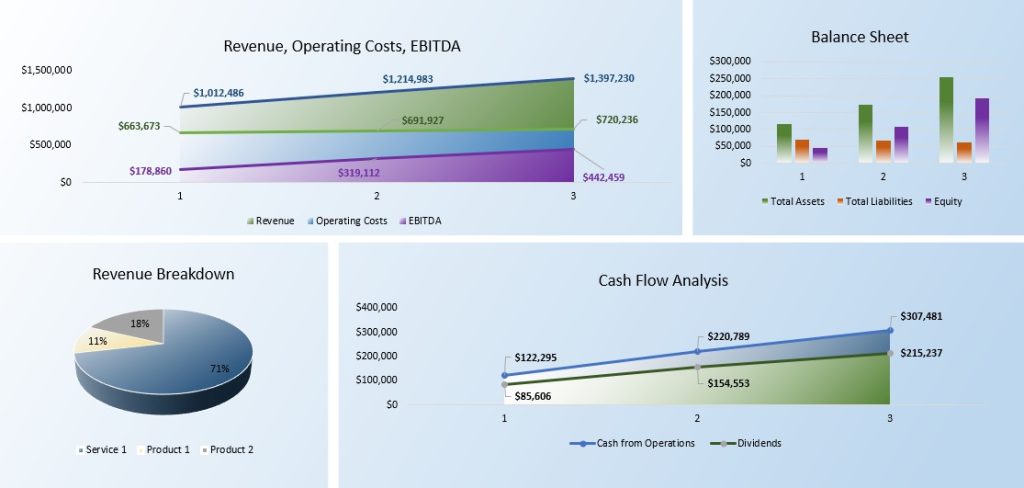
1.0 Executive Summary
The purpose of this business plan is to raise $100,000 for the development of a clothing store while showcasing the expected financials and operations over the next three years. The Clothing Store, Inc. (“the Company”) is a New York based corporation that will provide a number of different high end clothing pieces to customers in its targeted market. The Company was founded in 2009 by John Doe.
1.1 Operations
The Clothing Store is a business that specializes in the retailing of high end apparel. Through its store, the Company intends to sell a number of high end men’s and women’s shoes, scarves, sweaters, belts, and other apparel among a number of high end brand names including Gucci, Bruno Magli, and Coach. After the business begins its operations, the Company will launch an online ordering platform to generate sales on a nationwide basis. These additional sales will allow the business to reach profitability very quickly. The third section of the business plan will further describe the products offered by the Clothing Store
1.2 The Financing
Mr. Doe is seeking to raise $100,000 from as a bank loan. The interest rate and loan agreement are to be further discussed during negotiation. This business plan assumes that the business will receive a 10 year loan with a 9% fixed interest rate.
1.3 Mission Statement
The Clothing Store’s mission is to become the recognized leader in its targeted market for high end apparel products.
1.4 Management Team
The Company was founded by John Doe. Mr. Doe has more than 10 years of experience in the retail industry. Through his expertise, he will be able to bring the operations of the business to profitability within its first year of operations.
1.5 Sales Forecasts
Mr. Doe expects a strong rate of growth at the start of operations. Below are the expected financials over the next three years.
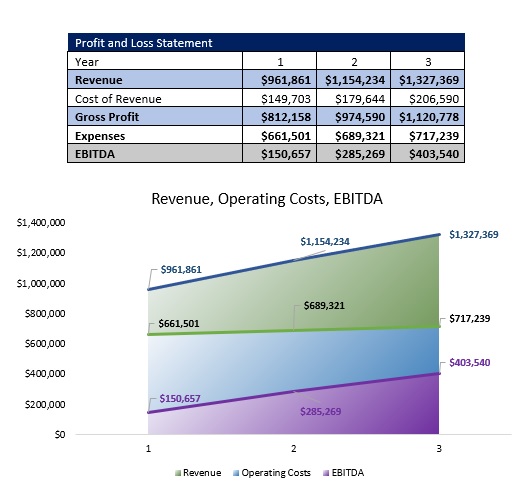
1.6 Expansion Plan
The Founder expects that the business will aggressively expand during the first three years of operation. Mr. Doe intends to implement marketing campaigns that will effectively target individuals within the target market.
2.0 Company and Financing Summary
2.1 Registered Name and Corporate Structure
Clothing Store, Inc. The Company is registered as a corporation in the State of New York.
2.2 Required Funds
At this time, the Clothing Store requires $100,000 of debt funds. Below is a breakdown of how these funds will be used:
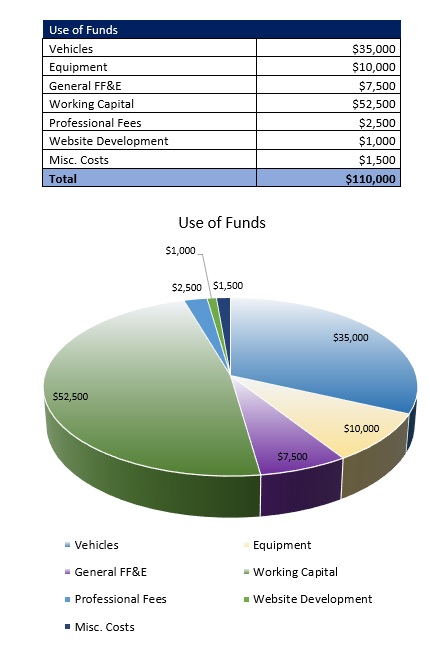
2.3 Investor Equity
Mr. Doe is not seeking an investment from a third party at this time.
2.4 Management Equity
John Doe owns 100% of the Clothing Store, Inc.
2.5 Exit Strategy
If the business is very successful, Mr. Doe may seek to sell the business to a third party for a significant earnings multiple. Most likely, the Company will hire a qualified business broker to sell the business on behalf of the Clothing Store. Based on historical numbers, the business could fetch a sales premium of up to 4 times earnings.
3.0 Operations
The Company will actively sell and trade men’s and women’s high end apparel to its retail clients. Our manufactures will provide us with the branded label merchandise. All of the Company’s sold apparel will always be of the highest retail quality. The business will carry several brands of high end men’s and women’s apparel including, Armani, Versace, Kenneth Cole, Polo, Ralph Lauren, Bruno Magli, Gucci, Coach, and a number of other very high end men’s and women’s apparel manufacturers. Management anticipates that the Company will be able to mark-up our purchased inventory 65% of its actual cost. This is an unusually high margin for a branded label merchandise business. The key to the success of the business will depend on Management’s ability to create a stable brand that attracts a wealthy middle to upper middle income earning group within the targeted region.
4.0 Strategic and Market Analysis
4.1 Economic Outlook
This section of the analysis will detail the economic climate, the apparel industry, the customer profile, and the competition that the business will face as it progresses through its business operations. Currently, the economic market condition in the United States is in recession. This slowdown in the economy has also greatly impacted real estate sales, which has halted to historical lows. Many economists expect that this recession will continue until mid-2009, at which point the economy will begin a prolonged recovery period.
4.2 Industry Analysis
The direct retail sale of apparel to the end user is a $150 billion dollar a year industry in the United States. This growth rate for this industry has been tremendous over the last five years. Growth is expected to occur at a rate of 4% to 5% on an annual basis. This is primarily due to the shift in advertising by brand name and high end retail stores. The economic tastes of Americans have changed significantly over the last five years as the overall wealth of the country has grown. As Americans now have more access to capital and an increased borrowing capacity, their ability to spend money on brand name and luxury items has also increased. Retail sales operations are a slightly riskier operation to maintain. This is due to the fact that there are significant costs in maintaining a high end retail location in an urban or upscale suburban market. There failure rate for these businesses is approximately 65% for the first five years of operations. Management is currently building a number of proprietary marketing and pricing models to help ensure the continued success of the Company.
4.3 Customer Profile
In this section of the analysis, you should describe the type of customer you are seeking to acquire. These traits include income size, type of business/occupation; how far away from your business is to your customer, and what the customer is looking for. In this section, you can also put demographic information about your target market including population size, income demographics, level of education, etc.
4.4 Competitive Analysis
This is one of the sections of the business plan that you must write completely on your own. The key to writing a strong competitive analysis is that you do your research on the local competition. Find out who your competitors are by searching online directories and searching in your local Yellow Pages. If there are a number of competitors in the same industry (meaning that it is not feasible to describe each one) then showcase the number of businesses that compete with you, and why your business will provide customers with service/products that are of better quality or less expensive than your competition.
5.0 Marketing Plan
The Clothing Store intends to maintain an extensive marketing campaign that will ensure maximum visibility for the business in its targeted market. Below is an overview of the marketing strategies and objectives of the Clothing Store.
5.1 Marketing Objectives
- Implement a local campaign with the Company’s targeted market via the use of flyers, local newspaper advertisements, and word of mouth.
- Develop an online presence by developing a website and placing the Company’s name and contact information with online directories.
5.2 Marketing Strategies
Mr. Doe intends on using a number of marketing strategies that will allow the Clothing Store to easily target men and women within the target market. These strategies include traditional print advertisements and ads placed on search engines on the Internet. Below is a description of how the business intends to market its services to the general public. The Clothing Store will also use an internet based strategy. This is very important as many people seeking local services, such as clothiers, now the Internet to conduct their preliminary searches. Mr. Doe will register the Company with online portals so that potential customers can easily reach the Clothing Store business. The Company will also develop its own online website. The Company will maintain a sizable amount of print and traditional advertising methods within local markets to promote the apparel that the Company is selling.
5.3 Pricing
In this section, describe the pricing of your services and products. You should provide as much information as possible about your pricing as possible in this section. However, if you have hundreds of items, condense your product list categorically. This section of the business plan should not span more than 1 page.
6.0 Organizational Plan and Personnel Summary
6.1 Corporate Organization

6.2 Organizational Budget

7.0 Financial Plan
7.1 Underlying Assumptions
- The Owner will acquire $100,000 of debt funds to develop the business.
- The Clothing Store will have an annual revenue growth rate of 16% per year.
- The loan will have a 10 year term with a 9% interest rate.
7.2 Sensitivity Analysis
In the event of an economic downturn, the business may have a decline in its revenues. However, the high gross margins generated by the business will ensure that the business will maintain profitability despite deleterious economic conditions.
7.3 Source of Funds

7.4 General Assumptions

7.5 Profit and Loss Statement
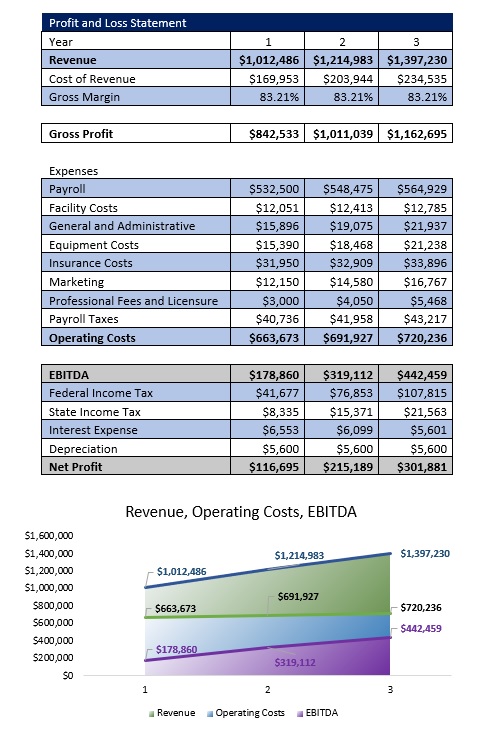
7.6 Cash Flow Analysis
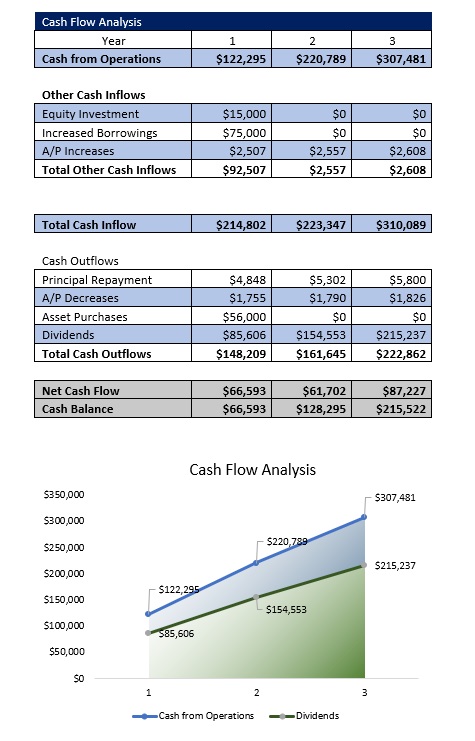
7.7 Balance Sheet

7.8 Breakeven Analysis
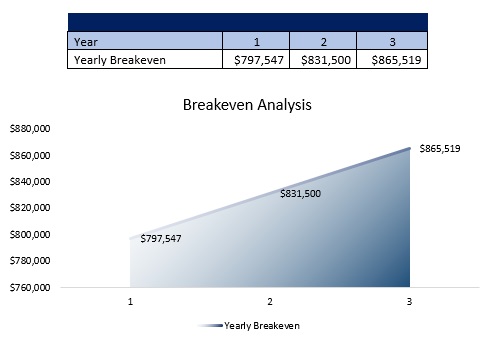
7.9 Business Ratios
